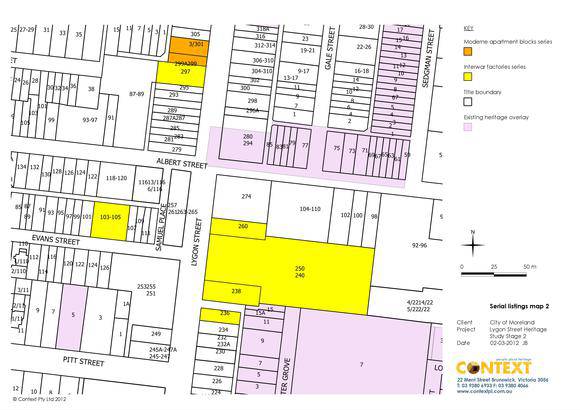| Back to search results » | Back to search page » |
|
Interwar Factories
Other NameFactory, G. Burgin, Perfection Knitting Mills, Austral Wire and Fence, Hopely's, Sleeping Beauty Location103-105 EVANS STREET, and 236, 238, 240, 260 & 297 LYGON STREET, BRUNSWICK EAST, MORELAND CITY LevelIncluded in Heritage Overlay |
|
Statement of Significance
What is significant? The buildings generally date from the 1930s or very late 1920s, and
can be divided into two distinctive styles; Eclectic and Moderne. The
Eclectic style buildings (103-105 Evans Street, 240 Lygon Street and
297 Lygon Street) exhibit elements of the Free Classical, stripped
Greek Revival and stripped Egyptian Revival respectively. The Moderne
style factories have flat unadorned parapets, with Art Deco fins,
curved walls and decoration provided by contrasting bands of smooth
render and red brick. Included in this series are the following places::
How is it significant?
Why is it significant? Architecturally, the six factories are significant as examples of
interwar styles applied to an industrial building and are notable for
the detailing to their facades. The three earliest factories
demonstrate the eclecticism seen in the first half of this period,
ranging from Free Classical (103-105 Evans St), to stripped Greek
Revival (297 Lygon St), and the rare Egyptian Revival (240 Lygon St).
The other three demonstrate the dominance of the Moderne style in the
later interwar years, as well as its evolution from the more
decorative and polychromed factory at 260 Lygon St, with its
decorative fins, also seen in a more delicate form at 236 Lygon St, to
the stripped back and austere factory at 238 Lygon St which relies on
the juxtaposition of horizontal concrete hoods and a curved wall.
(Criteria D & E)
The buildings which make up the Interwar Factories series as
described are located in Lygon Street and Evans Street Brunswick. The
factories are on a variety of single or multiple allotments of varying
size, which are non-contiguous, with the exception of those located at
236, 238, 240 & 260 Lygon Street. The factories are all
constructed of brick, either face brick with rendered dressings or
rendered brick. 236 and 260 Lygon Street are two storey factories
(incorporating office facilities on the upper floor?) while the
remainder are single storey. Rooflines are generally concealed behind
parapets, but where visible from the public realm, they illustrate a
progression over time. Generally, all of the buildings are in good to
very good condition and although there have been minor alterations,
retain a high degree of integrity externally
- Former Sleeping Beauty Factory - 103 -105 Evans Street,
Brunswick
- Former Hopely's Factory - 236 Lygon Street,
Brunswick
- Former Factory - 238 Lygon Street, Brunswick
-
Former Austral Wire and Fence Company - 240 Lygon Street,
Brunswick
- Former G. Burgin Factory - 260 Lygon Street,
Brunswick
- Former Perfection Knitting Mills - 297 Lygon Street, Brunswick
The Interwar Factories series is of historical and aesthetic
(architectural) significance to the City of Moreland.
Historically, the series of six interwar factories are the best
representative examples of the numerous small factories constructed in
the Lygon Street North area in the period between 1920 and 1940, made
possible by the trade protection of the textile industry in Australia
in the early twentieth century. The factories in this series are able
to demonstrate a high degree of integrity externally and provide
evidence of the important manufacturing (and particularly, textile
manufacturing) industry which employed large numbers of local men and
women before 1945, and an increasingly large migrant workforce post
1945. The factories are of further historical significance as they
represent the strong industrial focus and mixed use of Brunswick,
which mixed working class housing with the places of work of its
residents. (Criterion A)
Group
Manufacturing and Processing
Category
Factory/ Plant







